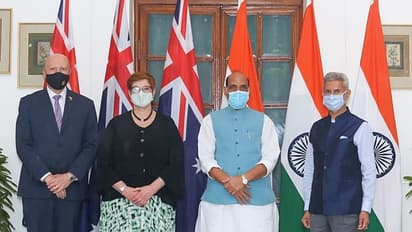Afghanistan, terrorism dominate India-Australia '2+2' dialogue

Synopsis
India and Australia on Saturday held their first-ever 2+2 ministerial dialogue in Delhi, wherein the four leaders discussed the entire gamut on bilateral, regional and global issues, in which the Afghanistan crisis and Indo-Pacific were the focus areas.
India and Australia on Saturday held their first-ever 2+2 ministerial dialogue in Delhi, wherein the four leaders discussed the entire gamut on bilateral, regional and global issues, in which the Afghanistan crisis and Indo-Pacific were the focus areas.
In the dialogue, Defence Minister Rajnath Singh and Foreign Minister S Jaishankar represented the Indian delegation while the Australian side was led by Foreign Minister Marise Payne and Defence Minister Peter Dutton.
Afghan crisis
The two sides were of the view that the Afghanistan soil must not be used for terror activities.
While addressing the media persons after the dialogue, Rajnath Singh said that the two sides discussed institutional frameworks for partnership in areas, including defence cooperation and the fight against the global pandemic.
The two sides also exchanged views on Afghanistan, cooperation in multilateral formats and maritime security in the Indo-Pacific.
The '2+2' dialogue also saw India and Australia discuss developments in neighbouring regions. The situation in Afghanistan dominated the discussions.
It was agreed that the international community must be united in its approach and guided by UN Security Council Resolution 2593.
During the bilateral defence meeting on Friday, Rajnath Singh and Dutton discussed the Taliban rise and challenges for the world order following the fall of the democratic-elected Ashraf Ghani government and the take over by the Taliban on August 15.
In the meeting, New Delhi called for the implementation of United Nations Security Council Resolution 2593.
The UNSC has under India's presidency, on August 30, adopted its 2593 resolution, which called for preventing the use of Afghan territory to threaten or attack any country.
The resolution also reiterated the need to combat terrorism in Afghanistan. including those individuals and organisations designated under resolution 1267 and noted the Taliban's relevant commitments.
On the formation of the Taliban government in Kabul, Jaishankar said that India is concerned about inclusiveness in Afghanistan’s new "dispensation".
Australian foreign minister Marise Payne said Afghanistan should not become the safe haven for terrorists once again.
"We share strong interests in ensuring that Afghanistan never again becomes safe haven for breeding, training of terrorists. We are also very focused on seeking safe passage for citizens, foreign nationals, visa holders of other countries who seek to leave Afghanistan," Payne said.
On human rights, including women and minorities, the Australian foreign minister said, "In relation to the position of women and girls, for 20 years we've worked with the international community and people of Afghanistan to ensure better circumstances for women."
Two decades of 9/11 attack
On this day two decades back, using commercial aircraft the Al Qaeda terrorists had crashed into New York-based World Trade Center, the Pentagon and a Pennsylvania field, killing around 3,000 people and countless injured.
Jaishankar said that the 20th anniversary of 9/11 was a reminder of the importance of combating terrorism without compromise.
Considering that India was closer to its epicentre, Jaishankar said that international cooperation in this regard holds much value.
He further said that the 9/11 anniversary was a reminder of barbaric acts of terror.
Indo-Pacific Region
During the meeting, the two sides maintained that they share an important partnership that is based on a shared vision of a free, open, inclusive and prosperous Indo-Pacific region.
Rajnath Singh said that the two democracies had a common interest in the peace and prosperity of the entire region.
During the discussions, both sides stressed the need to ensure free flow of trade, adherence to international rules and sustainable economic growth in the entire region.
Asserting that the peaceful development of the Indo-Pacific has been India's focus, Jaishankar said that both countries believe that development in the region should be participative and collaborative.
Australian Defence Minister Dutton said that both India and Australia depend on open and free access to sea lanes in the Indo Pacific, for trade & economic well-being.
Reiterating that India and Australia were actively engaged in ASEAN-led architecture, Payne said that the two nations were committed to supporting the practical implementation of the ASEAN outlook on Indo-Pacific.
An informal diplomatic network and a constructive engagement is contributing to that open, inclusive region, he said.